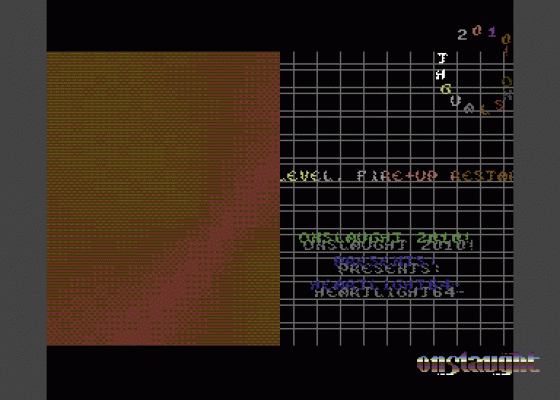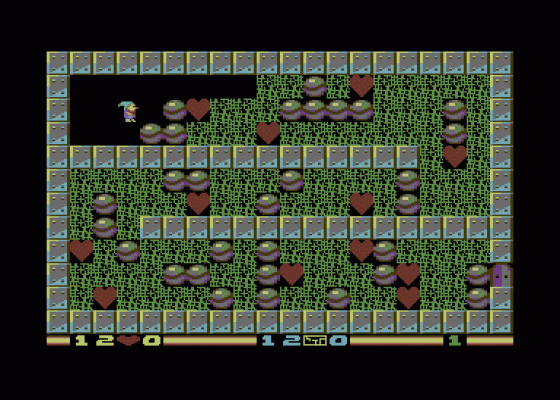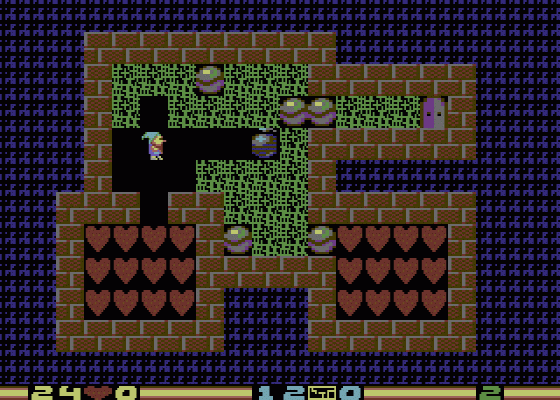
Micro Mart
 11th February 2010
11th February 2010
Categories: Retro Gaming
Author: Shaun Bebbington
Published in Micro Mart #1093
Ever wondered what gnomes get up to when you're not looking? Or wanted to control satellites, coloured blocks or partake in an improbable war? If the answer is yes, then you're in the right place, as Shaun explains...
Retro Mart: All You Need Is Love
Originally written by Peter Liepa and Chris Gray for the Atari 400 and compatibles, Boulder Dash was an instant and endearing classic. It was published by First Star Software in 1984, and then ported and converted to almost all the popular 8-bit home computer of the day.
Following very much in the same vein as this classic is Heartlight 64 for the Commodore 64, created by Onslaught. This sees you controlling a gnome-alike creature who's been trapped in an evil series of mazes. In order to be freed, you must guide him to collect a set number of love hearts (isn't that sweet?) per level before you can move onto the next. Out to hinder your progress are the obligatory falling rocks. Bombs are included, which will blow up certain inanimate objects such as walls once they touch, and helium-filled balloons also add to the challenge, which can be weighted down but can also trap our hero if he doesn't move out of the way in time.
Currently, there's a 12-level playable preview available to download, which can be taken from the Commodore Scene Database (CSDb) at https://csdb.dk/release/?id=87696. If you sign up to this site, you may also discuss the development directly with the author, should you need to, and it's generally a good place to find out information about the old bread-bin too - especially if you like keeping up with the latest movers and shakers in the C64 community.
Moving onto Commodore's first colour computer (the VIC-20), two games have recently appeared thanks to VIC guru Jeffrey Daniels. The first is described as a "turn based strategy game with 'fog of war' elements and a retro-futuristic theme" (crikey!) called The Improbable War. And secondly, it's a sequel to another of Jeffrey's works, called Ten Ten Again, with the object being to move two coloured blocks from one part of the maze to another, matching the colours to the final goal.
The problem is that each block moves when the other one does, and the only way to move one independently is to trap the other against a solid wall.
Both of these games will work on the unexpanded machine and will require a joystick, and can be discussed and downloaded at tinyurl.com/NewVICfor2010.
Sputnik
A rather difficult puzzle game has found its way onto the Atari XE/XL, entitled Satellite, written by Marek Cora with music by Pawel Banas. The aim of the game is to control a pair of circling satellites around five rather cruelly designed levels in order to collect the coloured space debris. This in turn simply amasses points for you, and for each item collected, another one will take its place.
The problem is that it must be matched, so your yellow satellite will not be able to collect a blue piece. The somewhat harsh time-limit dissipates rather quickly, especially so if any of the immovables on the levels are touched by either satellite, meaning some quite precise and anxious movements are required. This is especially so, as the satellites generally rotate, meaning that timing the moves safely is quite difficult, and hence why only five levels have been included.
Although you may get a feeling of frustration, and quite often, it's not a game that can't be learnt if you're willing to stick at it for a while, providing of course you can resist throwing your joystick at the nearest hard-wearing inanimate object. This is all relative as to how much of a challenge you want your 8-bit games to throw up. To grab this release, point your web-browser at tinyurl.com/SatelliteAtari.
While on the subject of Atari, I've noticed that the American-based Atlantis Games Group has updated its long-awaited OutRun project for the XE/XL, which I will tell you about as soon as I have some more information. Fortunately, one of the greatest arcade tunes in history is largely intact, and sounds superb through the machine's POKEY sound chip. That's all I can say for now though. See you next week.
This article was converted to a web page from the following pages of Micro Mart #1093.






